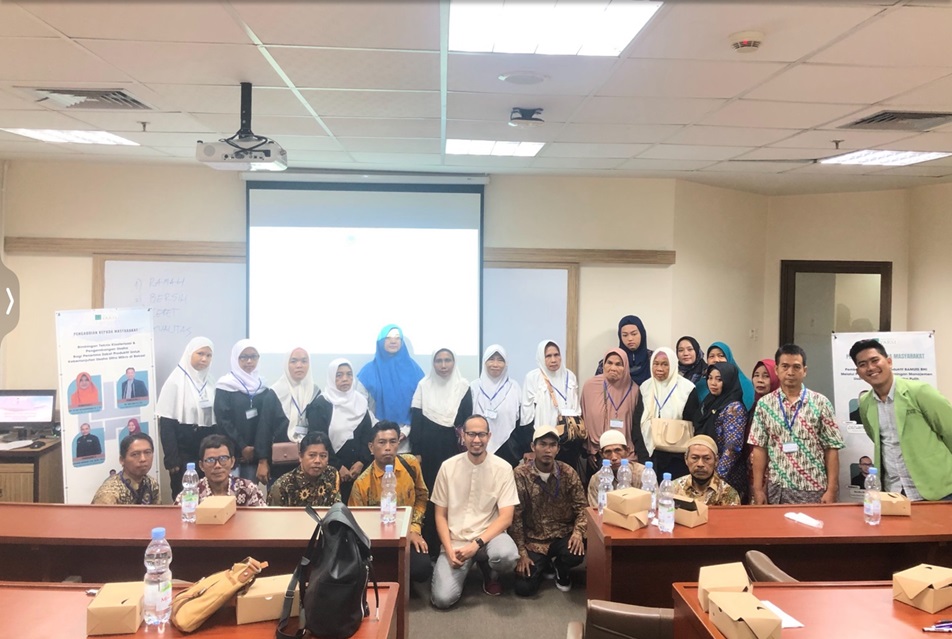Model Penguatan Penyaluran Zakat kepada Usaha Ultra Mikro melalui Pelatihan dan Pendampingan Model for Strengthening Zakat Distribution to Ultra Micro Enterprises through Training and Mentoring
Main Article Content
Abstract
The distribution of zakat to ultra-micro (UMi) business actors, such as Mustahik (people entitled to receive zakat), faces the problem of limited assistance. The Community Service (P2M) aims to minimize failures in the distribution of zakat and ensure that it is used for productive, sustainable, and on-target businesses. The next goal is to increase the quantity and quality of UMi management. The methods used are training, follow-up assistance, monitoring, and evaluation. Partners are UMi actors who receive zakat from the Baitulmal Ummat Islam Foundation Bank Negara Indonesia (BAMUIS BNI). The result of P2M is that previously, there was no assistance in the zakat distribution model. The positive impact is that this assistance increases the accuracy of targeting zakat recipients from the UMi group. This is based on qualitative analysis from the results of interviews with UMi and BAMUIS BNI. The increase in targeting indicates that the Mustahik from UMi are based on recommendations from indigent letters from neighborhood and citizen associations, so they are not concentrated in just a few families, as was the case previously. Another improvement in the distribution model is the absence of brokers, which is often found, unavoidably, without assistance. Another significant impact is that Mustahik receives 100% of the zakat funds directly to the account concerned without any deductions. The mentoring model also equips UMi with various skills training and consultations needed daily to run a business in the era of digital competition. The training includes marketing management, halal production, hygiene, occupational health, and safety.
Downloads
Article Details

This work is licensed under a Creative Commons Attribution-ShareAlike 4.0 International License.
Authors who publish with this journal agree to the following terms:
- Any article on the copyright is retained by the author(s).
- Author grant the journal, right of first publication with the work simultaneously licensed under a Creative Commons Attribution License that allows others to share work with acknowledgment of the work authors and initial publications in this journal.
- Authors are able to enter into a separate, additional contractual arrangements for non-exclusive distribution of published articles of work (eg, post-institutional repository) or publish it in a book, with acknowledgment of its initial publication in this journal.
- Authors are permitted and encouraged to post their work online (e.g., in institutional repositories or on their websites) prior to and during the submission process, as can lead to productive exchanges, as well as earlier and greater citation of published work.
- The article and any associated published material is distributed under the Creative Commons Attribution-ShareAlike 4.0 International License
References
Efendi, M. (2021). Pengelolaan Filantropi Islam di Tengah Pandemi Covid-19 (Studi Pada Komunitas Kurir Sedekah). Filantropi : Jurnal Manajemen Zakat dan Wakaf, 2(1). http://dx.doi.org/10.22515/finalmazawa.v2i1.2734
Kurniasari, N. D. (2015). Program CSR Berbasis Pemberdayaan Masyarakat (untuk Meningkatkan Produktivitas Usaha Mikro, Kecil Menengah di Madura). Jurnal NeO-Bis, 9(1). https://doi.org/10.21107/nbs.v9i1.685
Lubis, N., Silalahi, A. D., & Irama, O. N. (2022). Analisis Dana Zakat Produktif Sebagai Modal Usaha Mikro pada Badan Amil Zakat Nasional (BAZNAS) Provinsi Sumatra Utara. Jurnal Inovasi Penelitian, 2(10).
Nopiardo, W. (2016). Mekanisme pengelolaan zakat produktif pada badan amil zakat nasional tanah datar. JEBI (JURNAL EKONOMI DAN BISNIS ISLAM), 1(2).
Nopiardo, W. (2018). Perkembangan Pendapatan Mustahik Zakat Produktif Baznas Kabupaten Tanah Datar (Studi terhadap Mustahik Usaha Dagang Di Kecamatan Lima Kaum). At-Tijaroh: Jurnal Ilmu Manajemen dan Bisnis Islam, 4(2). https://doi.org/10.24952/tijaroh.v4i2.1095
Pratama, Y. C. (2015). Peran Zakat dalam Penanggulangan Kemiskinan (Studi Kasus: Program Zakat Produktif Pada Badan Amil Zakat Nasional). Tauhidinomics: Journal of Islamic Banking and Economics, 1(1). https://doi.org/10.15408/thd.v1i1.3327
Santoso, I. R. (2020). Analisis Implementasi Penyaluran Dana Zakat dan Infak di Badan Amil Zakat Daerah (BAZDA) Kota Gorontalo. Aksara: Jurnal Ilmu Pendidikan Nonformal, 5(2). https://doi.org/10.37905/aksara.5.2.149-156.2019
Setianingrum, A., Huda, N., & Santosa, P. W. (2020). The Prospects of Policies Integration on Zakat and Tax in Indonesia to Overcome the Economics Problem due to the COVID-19 Pandemic. International Conference of Zakat. https://doi.org/10.37706/iconz.2020.245
Setianingrum, A., Huda, N., & Santosa, P. W. (2021). Prospects of Zakat as Tax Credit in a New Normal COVID-19 Period. International Journal of Zakat, 6(1). https://doi.org/10.37706/ijaz.v6i1.242
Soegiastuti, J. (2012). Penerapan Strategi Corporate Social Responsibility (CSR) Untuk Memperkuat Usaha Mikro, Kecil Dan Menengah (UMKM). Media Ekonomi dan Manajemen, 25(1). http://dx.doi.org/10.24856/mem.v25i1.190
Wahdah, A. S. (2021). Analisis Pelaksanaan Program Baznas Microfinance Desa Terhadap Pengembangan Usaha Mikro Mustahik Pada Baznas Kabupaten Maros. In Frontiers in Neuroscience 14(1)
Widiastuti, T., & Rosyidi, S. (2015). Model Pendayagunaan Zakat Produktif Oleh Lembaga Zakat Dalam Meningkatkan Pendapatan Mustahiq. Jurnal Ekonomi Bisnis, 1(1). https://doi.org/10.20473/jebis.v1i1.1424
Zikrullah, Nuringwahyu, S., & Hardati, R. N. (2020). Efektivitas Program Corporate Social Responsibility Terhadap Pengembangan UMKM ( Studi Kasus Pada CSR PT . Amman Mineral Nusa Tenggara ). Jiagabi, 9(2).
